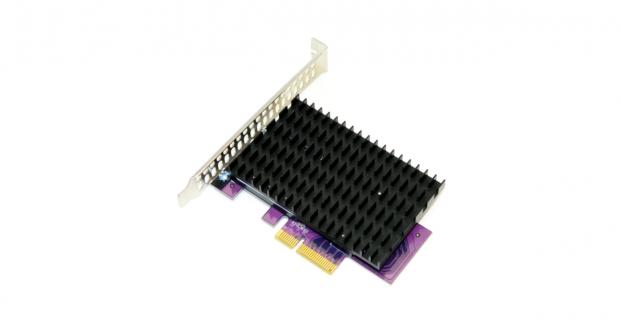
The Bottom Line
Introduction, Drive Specifications, Pricing and Availability
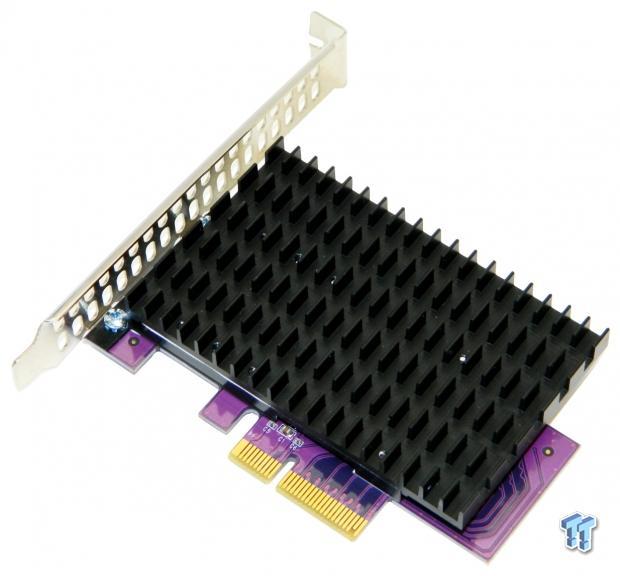
Samsung's SM951 AHCI M.2 SSD launched in January of last year and to this day it is still one of the fastest SSDs on the market. The SM951 AHCI PCIe Gen3 x4 M.2 SSD delivered the goods at the time like nothing previously seen. Even Intel's behemoth 750 Series NVMe SSDs had trouble outperforming this tiny M.2 SSD. The only issue with the SM951 AHCI was thermal throttling that in some cases greatly reduced performance.
Sonnet Technologies, a leading aftermarket company that mainly caters to the Mac crowd, has created a custom Add-In-Card (AIC) utilizing Samsung's SM951 AHCI M.2 SSD, a custom heat sink and an M.2 to PCIe Gen3 x 4 lane PCIe slot adapter, dubbed Tempo. The large custom heat sink wicks heat away from the drive's controller and flash packages, thus putting an end to the thermal throttling issues that have plagued the SM951 AHCI from day one.
Sonnet adds a hefty premium for this custom design, and that's to be expected from a company that caters mainly to Mac users. The price for the Tempo 512GB SSD is roughly $200 more than if you were to buy a 512GB SM951 AHCI in a standalone M.2 form factor. However, you get the benefit of a design that virtually eliminates thermal throttling as well as a more universal form factor that can be utilized on computers that do not have a built-in M.2 Gen3 x4 slot. Because the Tempo is an AHCI based drive, the Tempo has true plug and play capabilities for most Mac's as well as Windows PCs.
At the heart of the Tempo is a Samsung SM951 AHCI SSD, so we know it is going to be good; let's see how good.
Specifications
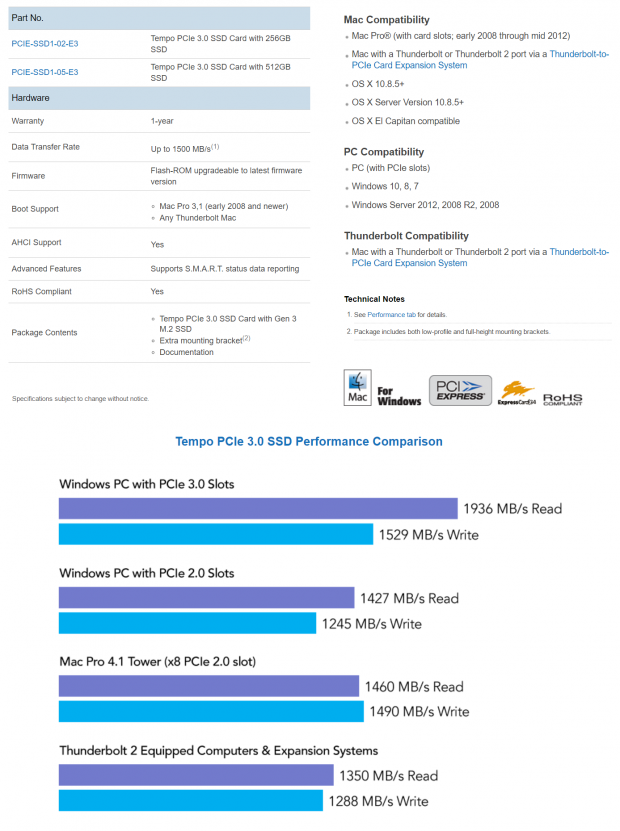
Sonnet's Tempo AIC SSD is available in two capacities: 256GB and 512GB. The 512GB model we have on the bench has the following factory specifications for Windows PC's with PCIe 3.0 slots:
- Sequential Read: up to 1936 MB/s
- Sequential Write: up to 1529 MB/s
- Max 4K Random Read Speed: not listed
- Max 4K Random Write Speed: not listed
The Tempo retail package includes the drive, half-height mounting bracket, full height mounting bracket, and printed quick start guide.
Sonnet warranties the Tempo for one year, which is way too short of a period in our opinion. Because the SM951 AHCI is an OEM product, the warranty and endurance are specified by the reseller instead of Samsung.
Drive Details
Sonnet Tempo PCIe SSD
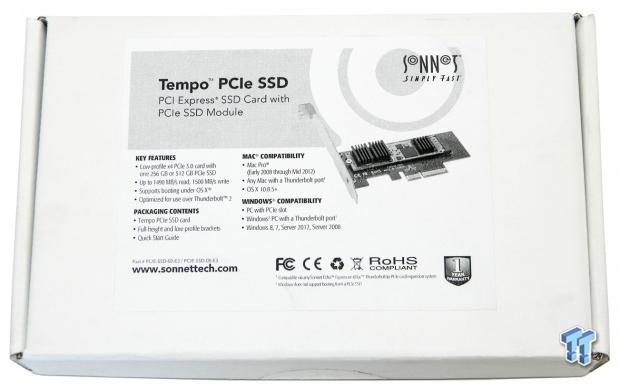
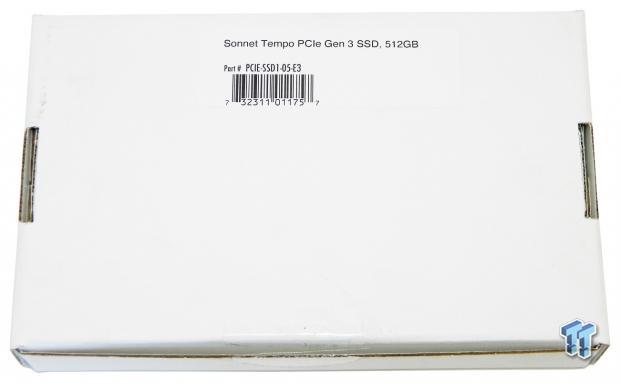
Sonnet ships the Tempo in a white cardboard flip top box. There is an outdated picture of the drive on the front along with outdated sequential read/write specifications.
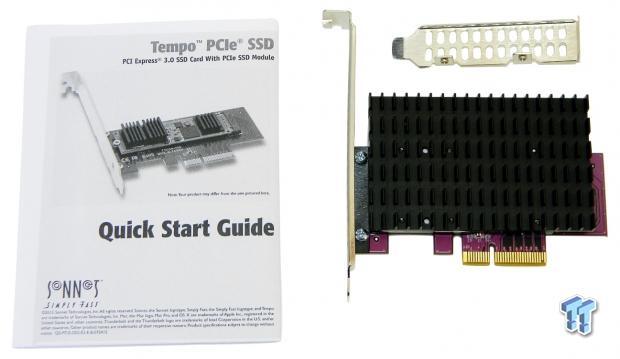
The drive is contained within an anti-static envelope, which we removed for our photos. You can see that Sonnet has outfitted the Tempo with a larger heat sink than depicted on the box. A half-height bracket and quick start guide are also included.
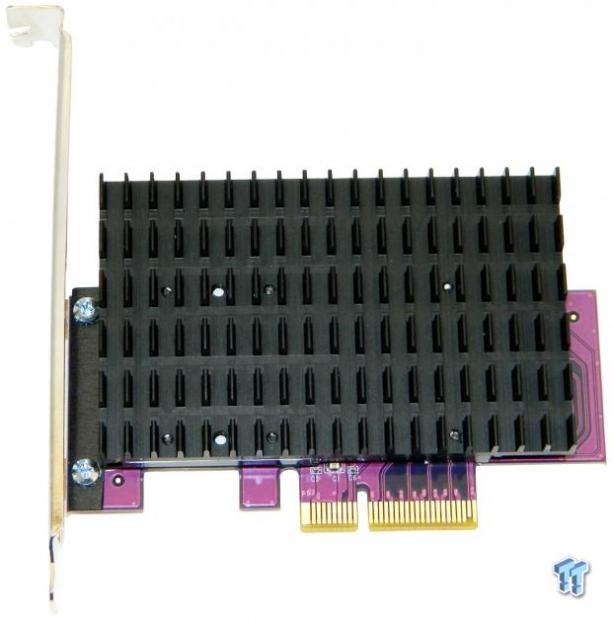
The SM951 at the heart of the Tempo is fully covered by the large finned aluminum heat sink. The heat sink looks removable, but it is not removable, it is glued to the SSD with thermal adhesive and adhesive strips.
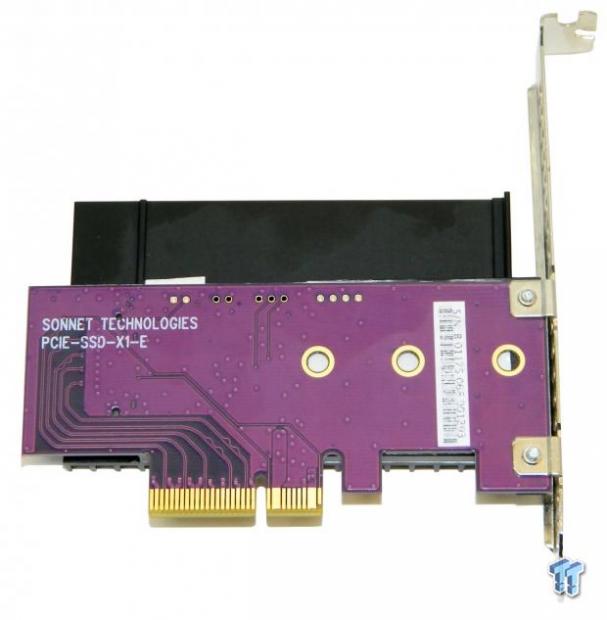
Sonnet uses a custom Gen3 x4 purple adapter card which some may find attractive.

A side view of the drive's large aluminum heat sink.
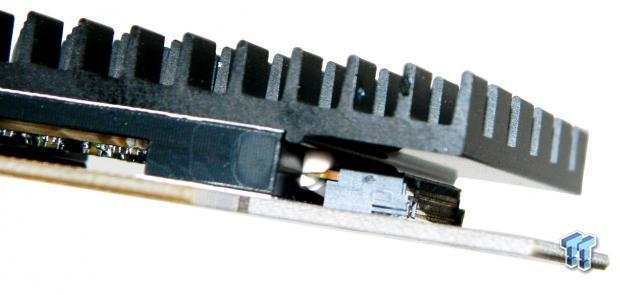
From this angle, we get a glimpse of a large blob of white thermal adhesive.
Test System Setup & Drive Properties
Jon's Consumer PCIe SSD Review Test System Specifications
- Motherboard: ASRock OC Formula Z170 - Buy from Amazon / Read our review
- CPU: Intel Core i7 6700K @ 4.7GHz - Buy from Amazon / Read our review
- Cooler: Swiftech H2O-320 Edge - Buy from Amazon / Read our review
- Memory: Corsair Vengeance LPX DDR4 16GB 3200MHz - Buy from Amazon
- Video Card: Onboard Video
- Case: IN WIN X-Frame - Buy from Amazon / Read our review
- Power Supply: Seasonic Platinum 1000 Watt Modular - Buy from Amazon / Read our review
- OS: Microsoft Windows 10 Professional 64-bit - Buy from Amazon
- Drivers: Intel RAID option ROM version 14.6.0.1029 and MS AHCI driver
We would like to thank ASRock, Crucial, Intel, Corsair, RamCity, IN WIN, and Seasonic for making our test system possible.
Drive Properties
Sonnet Tempo 512GB OS Disk 75% full
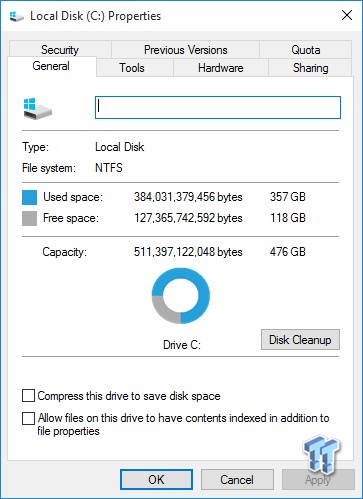
The majority of our testing is performed with our test drive as our boot volume. Our boot volume is 75% full for all OS Disk "C" drive testing to replicate a typical consumer OS volume implementation. We feel that most of you will be utilizing your SSDs for your boot volume and that presenting you with results from an OS volume is more relevant than presenting you with empty secondary volume results.
System settings: Cstates and Speed stepping are both disabled in our systems BIOS. Windows High-Performance power plan is enabled. Windows write caching is enabled, and Windows buffer flushing is disabled. We are utilizing Windows 10 Pro 64-bit OS for all of our testing except for our MOP (Maxed-Out Performance) benchmarks where we switch to Windows Server 2012 R2 64-bit.
Synthetic Benchmarks – ATTO & Anvil Storage Utilities
ATTO
Version and / or Patch Used: 2.47
ATTO is a timeless benchmark used to provide manufacturers with data used for marketing storage products.
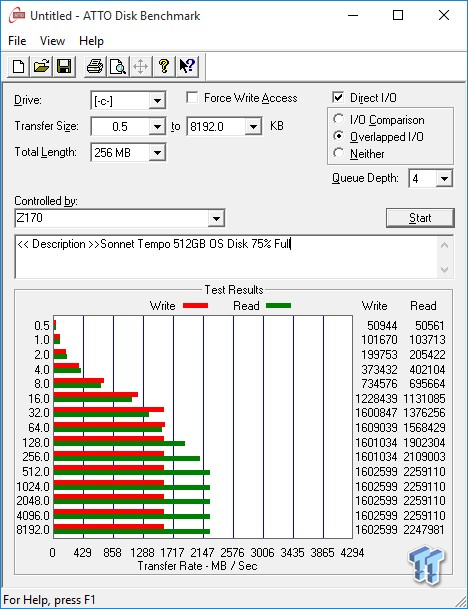
Sequential read/write transfers max out well above Sonnet's listed sequential specifications, especially on the sequential read side of things. Keep in mind this is our OS volume, and it is filled to 75% of its total capacity. The Tempo ramps up fast. The highest sequential read performance is achieved at 256KB transfers. The highest sequential write performance is achieved at 512KB transfers.
Sequential Write
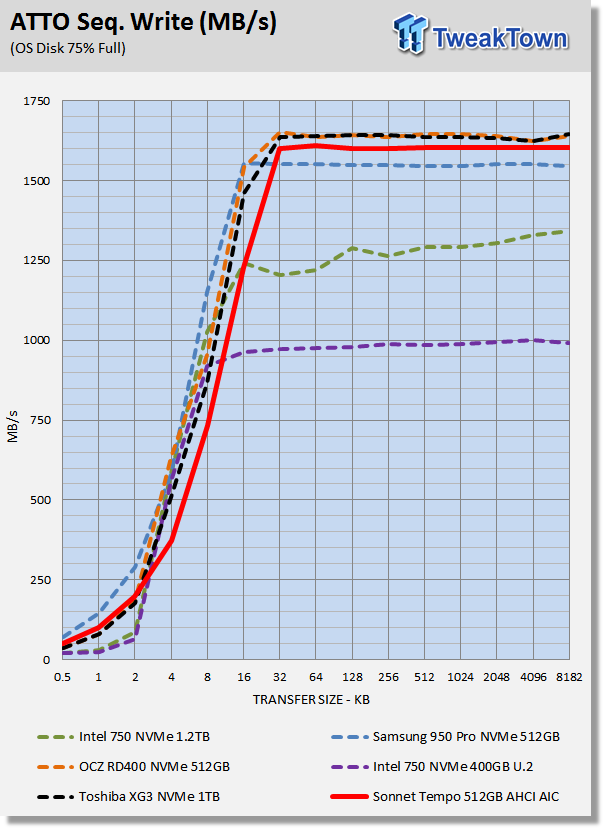
We decided to throw the Tempo into the fire and compare performance with today's fastest NVMe based SSDs. The Tempo hangs in there quite nicely even surpassing the sequential write performance of the 950 Pro. Toshiba's XG3 and RD400 deliver the best sequential write performance of the bunch.
Sequential Read
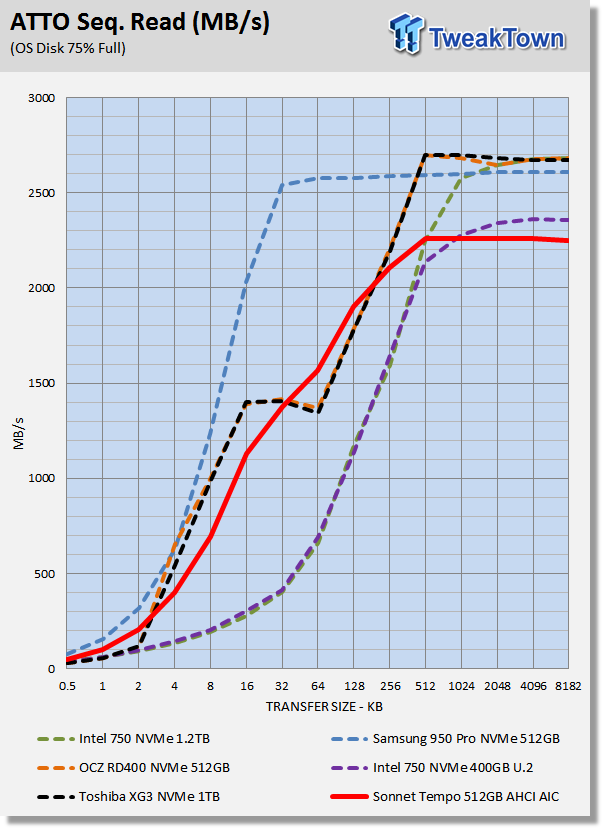
The Tempo delivers far superior performance in comparison to Intel's 750 Series NVMe SSDs at transfers of up to 512KB. Samsung's 950 Pro crushes the competition at transfers of up to 256KB.
Anvil Storage Utilities
Version and / or Patch Used: 1.1.0
Anvil's Storage Utilities is a storage benchmark designed to measure the storage performance of SSDs. The Standard Storage Benchmark performs a series of tests; you can run a full test or just the read or write test, or you can run a single test, i.e. 4k QD16.
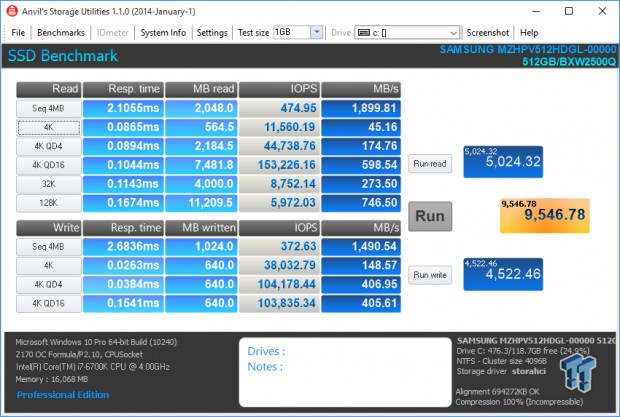
Scoring
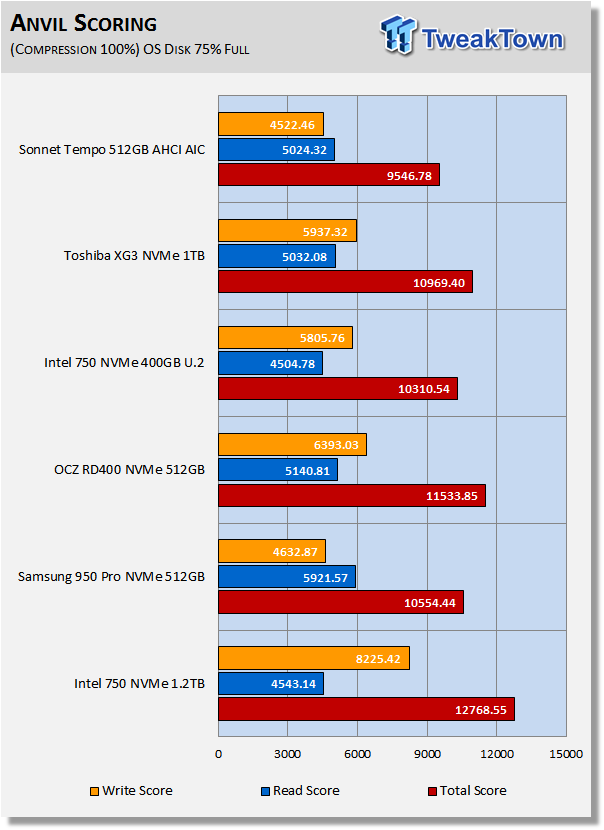
Anvil's scoring gives a good indication of a drive's overall performance. Regarding overall scoring, the Tempo delivers a nice score even though it is the lowest overall. This is to be expected from an AHCI-based SSD versus NVMe SSDs because the NVMe protocol inherently provides higher IOPS. If we focus on read performance, the Tempo easily outperforms Intel's 750 Series NVMe SSDs.
(Anvil) Read IOPS through Queue Depth Scale
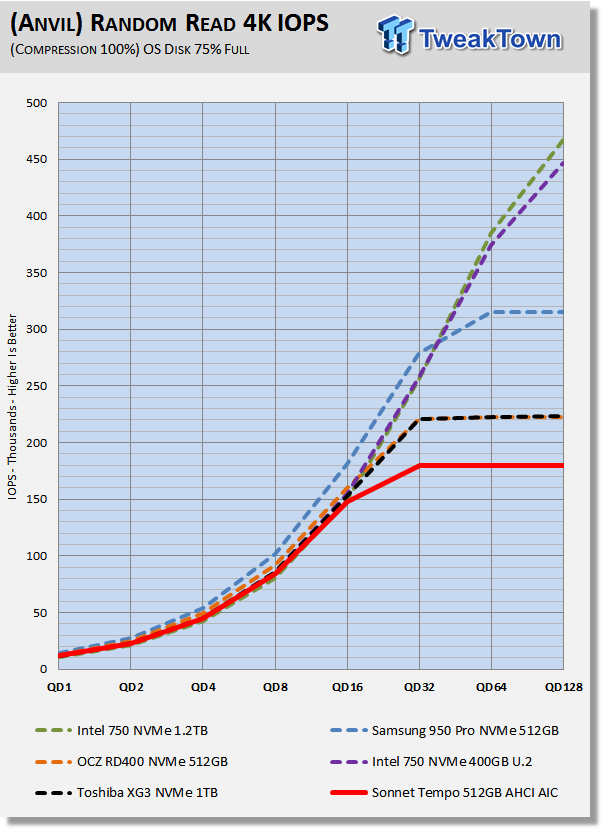
If you look closely, the Tempo does outperform the Intel 750's up to QD8.
(Anvil) Write IOPS through Queue Scale
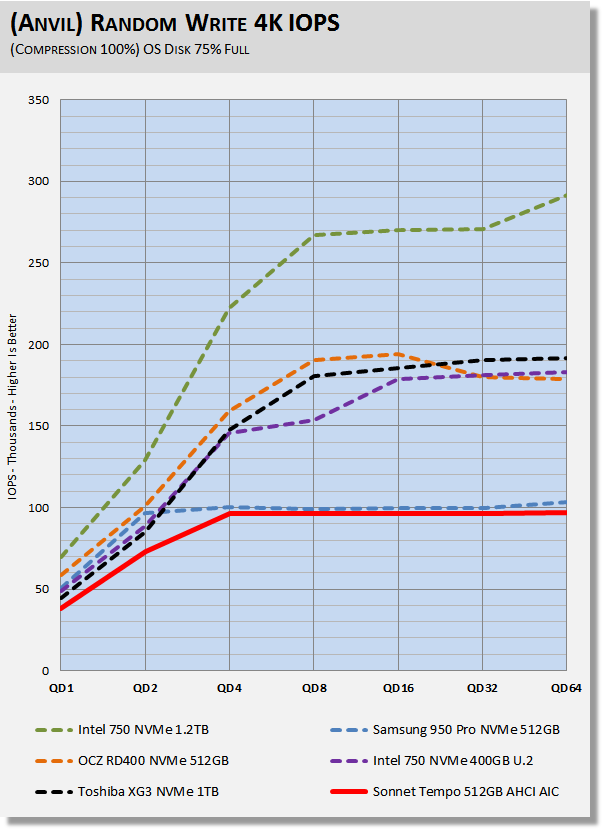
The Tempo is last across the board. However, it hangs in there with the 950 Pro at QD4 and beyond. This portion of the test falls into the 1.2TB Intel 750's wheelhouse, and it dominates from start to finish.
Synthetic Benchmarks - CrystalDiskMark & AS SSD
CrystalDiskMark
Version and / or Patch Used: 3.0 Technical Preview
CrystalDiskMark is disk benchmark software that allows us to benchmark 4k and 4k queue depths with accuracy. Note: Crystal Disk Mark 3.0 Technical Preview was used for these tests since it offers the ability to measure native command queuing at QD4.
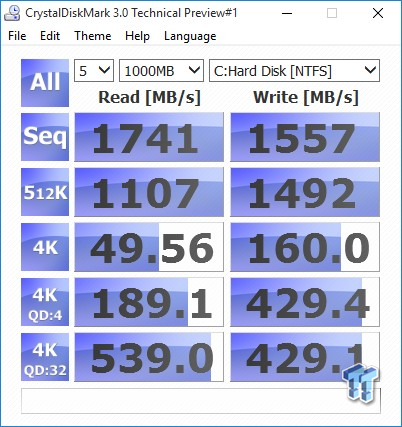
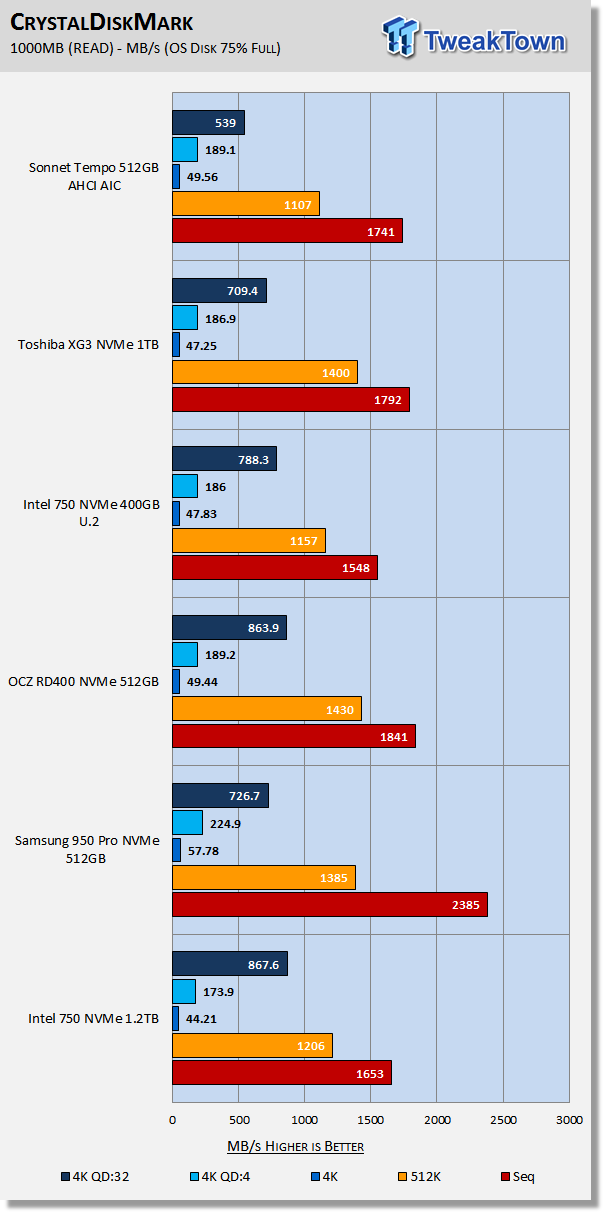
The Tempo outperforms both Intel 750's in three of the five measured categories. It delivers better sequential, 4K QD1 and 4K QD4 performance, which indicates that the Tempo will deliver better moderate workload performance than Intel's 750 series. Overall, Samsung's 950 Pro takes the win for the read portion of this testing.
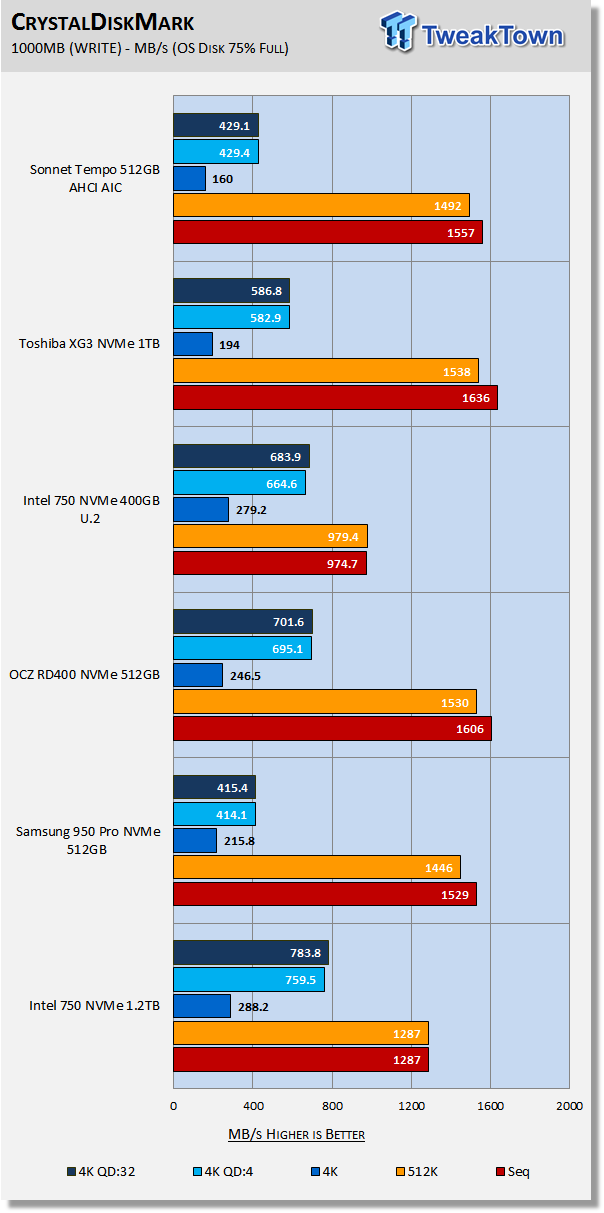
The Tempo outperforms the 950 Pro in four of the five measured categories. The NVMe-powered 950 Pro beats the Tempo at 4K QD1. Intel's 1.2TB 750 is lacking in sequential write speed but makes up for it with superior random performance.
AS SSD
Version and / or Patch Used: 1.7.4739.38088
AS SSD determines the performance of SSDs. The tool contains four synthetic as well as three practice tests. The synthetic tests are to determine the sequential and random read and write performance of the SSD.
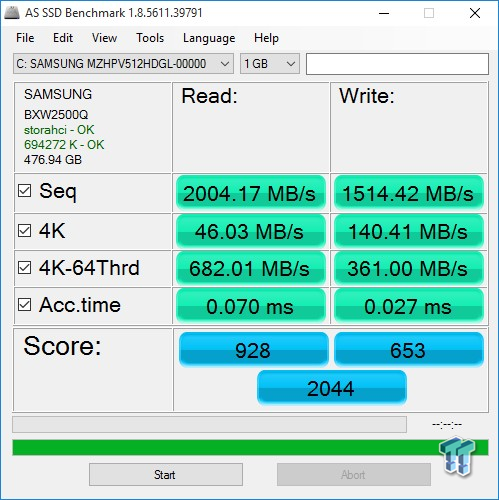
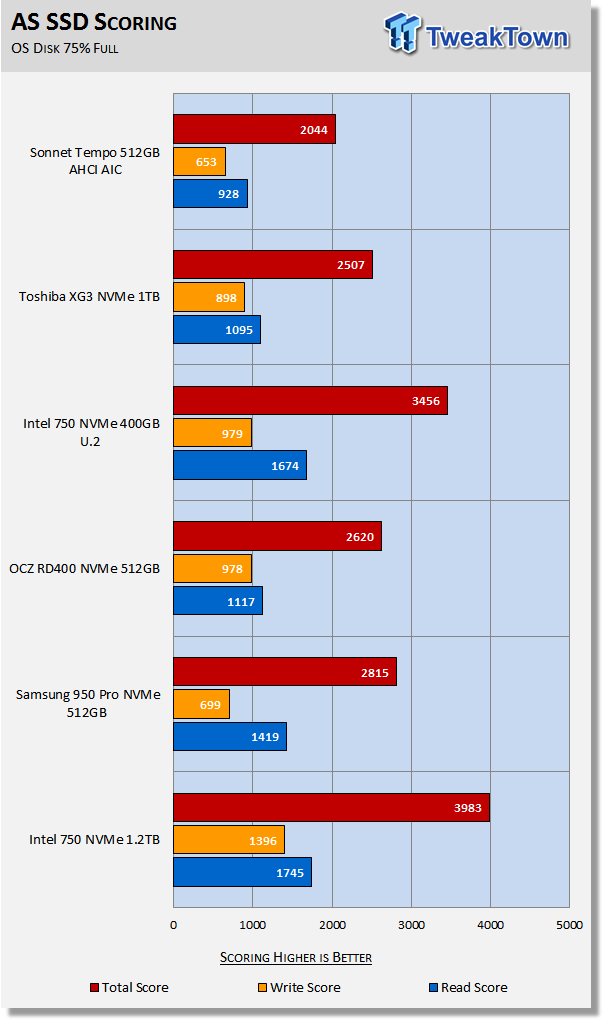
Intel's 750 SSDs dominate this testing due to the drive's superior random read/write performance. This is somewhat deceiving because the majority of the 750 Series' scoring comes from random performance at queue depths that are much higher than the average user will ever attain. All of the NVMe-powered drives outscore the Tempo.
Benchmarks (OS) - PCMark Vantage, PCMark 7 & PCMark 8
Moderate Workload Model
We categorize these tests as indicative of a moderate workload environment.
PCMark Vantage - Hard Disk Tests
Version and / or Patch Used: 1.2.0.0
The reason we like PCMark Vantage is because the recorded traces are played back without system stops. What we see is the raw performance of the drive. This allows us to see a marked difference between scoring that other trace-based benchmarks do not exhibit. An example of a marked difference in scoring on the same drive would be empty vs. filled vs. steady state.
We run Vantage three ways. The first run is with the OS drive 75% full to simulate a lightly used OS volume filled with data to an amount we feel is common for most users. The second run is with the OS volume written into a "Steady State" utilizing SNIA's consumer guidelines. Steady state testing simulates a drive's performance similar to that of a drive that been subjected to consumer workloads for extensive amounts of time. The third run is a Vantage HDD test with the test drive attached as an empty, lightly used secondary device.
OS Volume 75% Full - Lightly Used
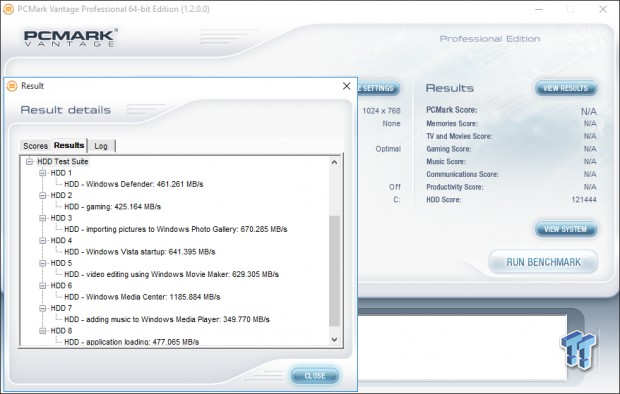
OS Volume 75% Full - Steady State
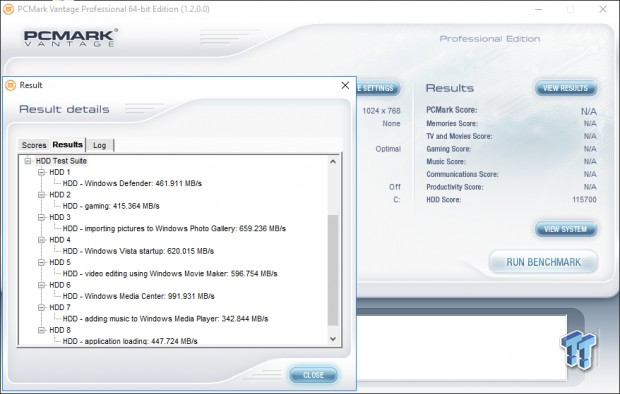
Secondary Volume Empty - FOB
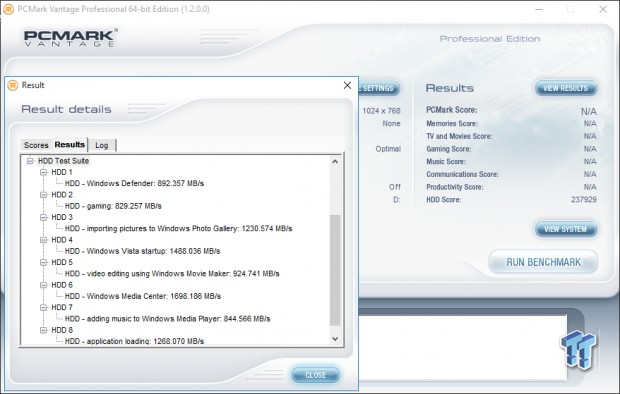
There's a big difference between an empty drive, one that's 75% full/used, and one that's in a steady state.
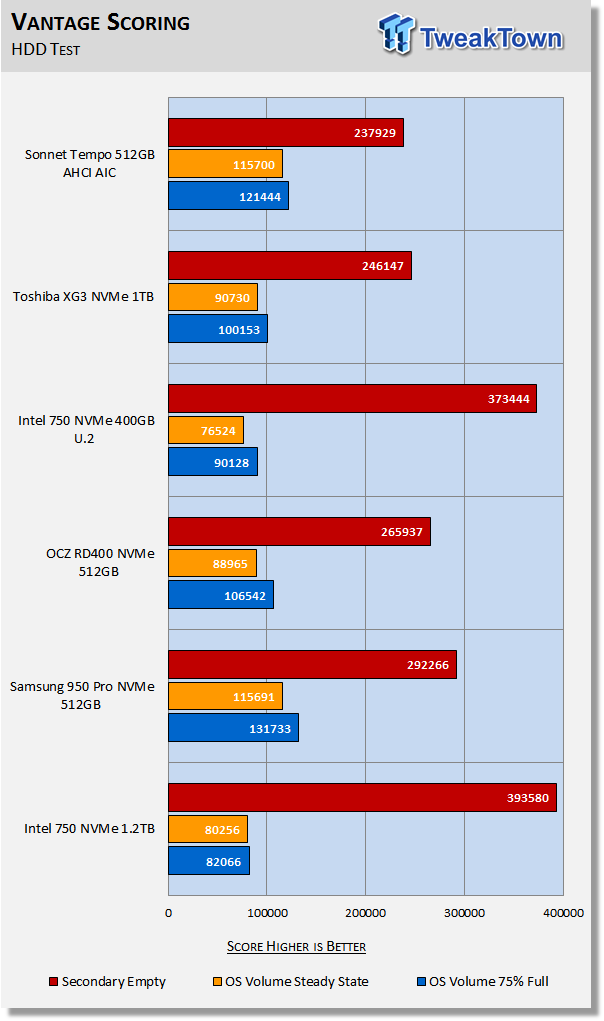
The important scores to pay attention to are "OS Volume Steady State" and "OS Volume 75% full." These two categories are most important because they are indicative of typical of consumer user states. When a drive is in a steady state, it means garbage collection is running at the same time it's reading/writing. This is exactly why we focus on steady state performance.
This testing, in particular, shows why we consider the nearly two-year-old SM951 AHCI SSD to still be one of the top performing SSDs on the market. If we focus on steady-state performance, we can see that the Tempo manages to win this test outright. The Tempo delivers far better 75% full and steady-state performance than the Toshiba and Intel NVMe SSDs. The Tempo is a moderate workload powerhouse.
PCMark 7 - System Storage
Version and / or Patch Used: 1.4.0
We will look to Raw System Storage scoring for evaluation because it's done without system stops and, therefore, allows us to see significant scoring differences between drives.
OS Volume 75% Full - Lightly Used
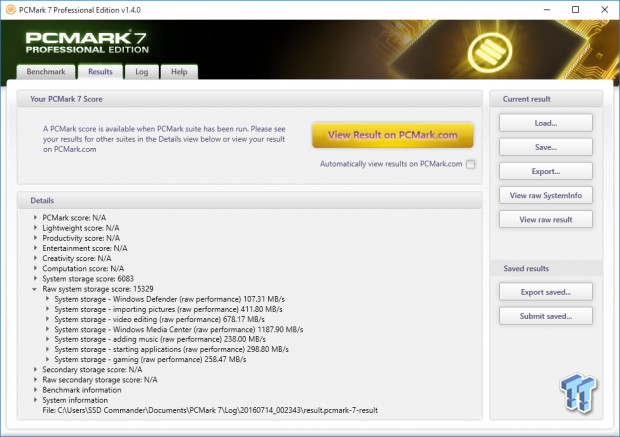
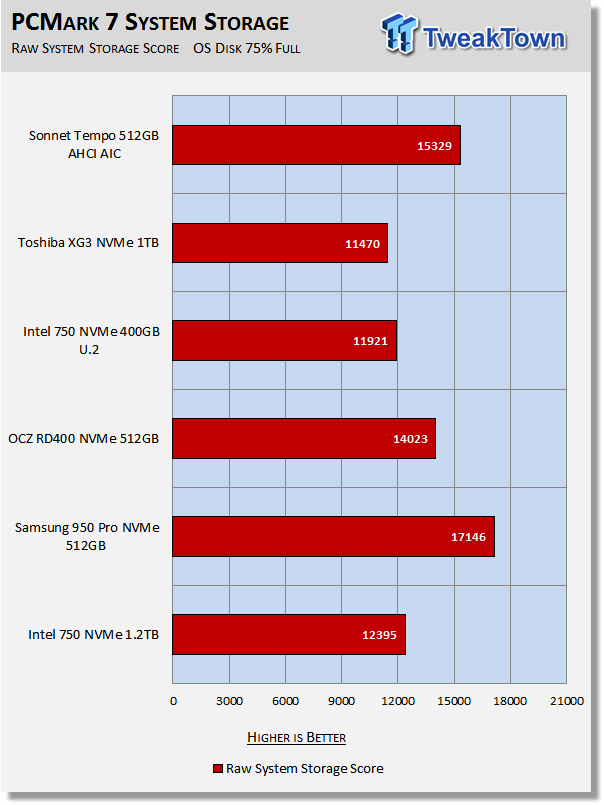
Again, we see the moderate workload prowess of Samsung's SM951 AHCI SSD - only the 950 Pro delivers higher performance. The Tempo handily outperforms the Intel and Toshiba offerings.
PCMark 8 - Storage Bandwidth
Version and / or Patch Used: 2.4.304
We use PCMark 8 Storage benchmark to test the performance of SSDs, HDDs, and hybrid drives with traces recorded from Adobe Creative Suite, Microsoft Office, and a selection of popular games. You can test the system drive or any other recognized storage device, including local external drives. Unlike synthetic storage tests, the PCMark 8 Storage benchmark highlights real-world performance differences between storage devices.
OS Volume 75% Full - Lightly Used
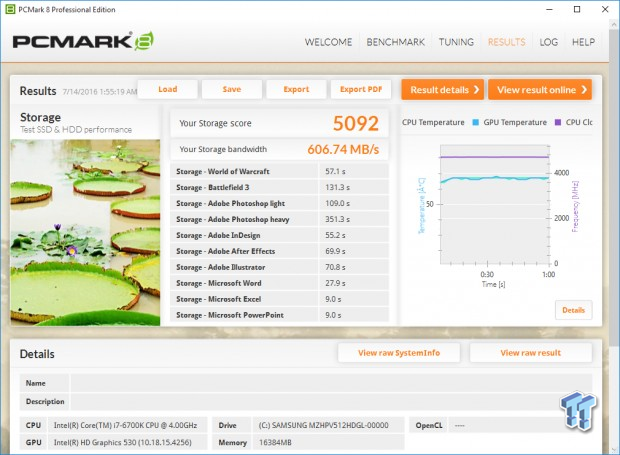
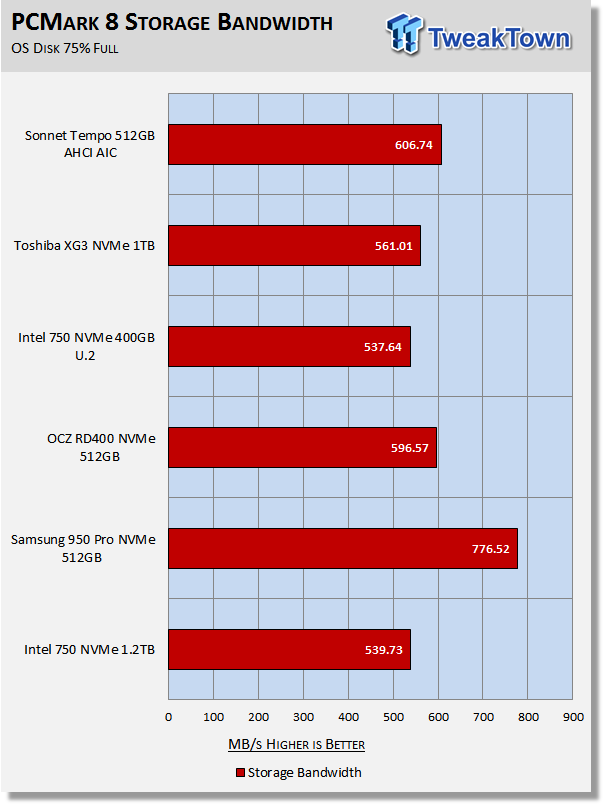
PCMark 8 is the most intensive moderate workload simulation we run. With respect to moderate consumer type workloads, this test is what we consider the best indicator of a drive's performance. Superior moderate workload performance is a hallmark of the Tempo. Once again, the Tempo defeats all but the 950 Pro.
Benchmarks (Secondary) - IOPS, Response & Transfer Rate
Iometer - Maximum IOPS
Version and / or Patch Used: Iometer 2014
We use Iometer to measure high queue depth performance. (No Partition)
Max IOPS Read
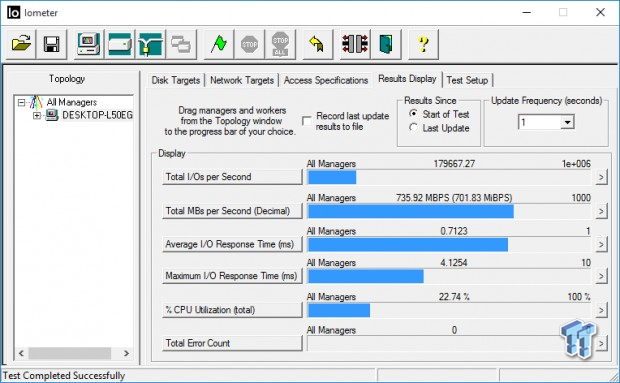
Max IOPS Write
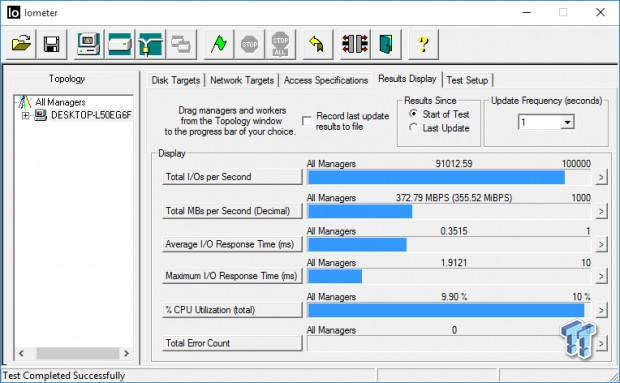
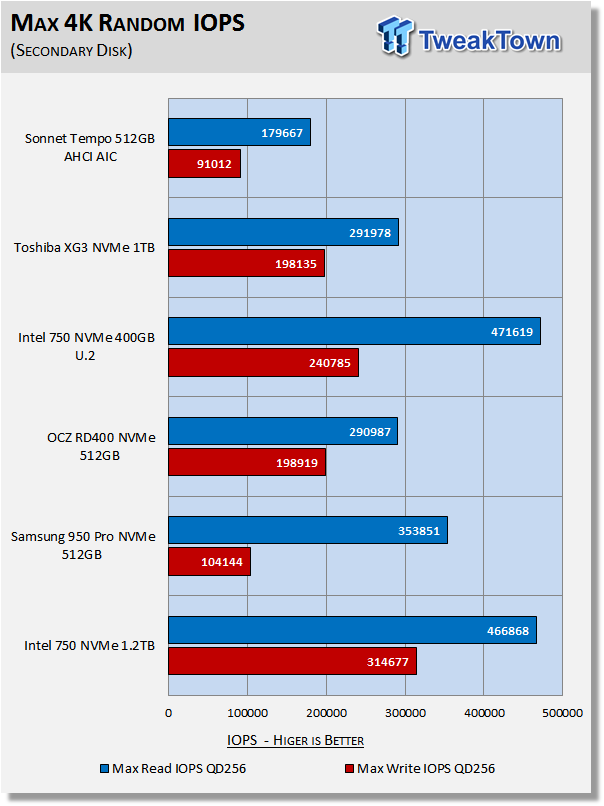
The NVMe-powered SSDs in our test pool clearly display the superiority of the new protocol. This time, Samsung's superior architecture does not factor in for the AHCI powered Tempo.
Iometer - Disk Response
Version and / or Patch Used: Iometer 2014
We use Iometer to measure disk response times. Disk response times are measured at an industry accepted standard of 4K QD1 for both write and read. Each test runs twice for 30 seconds consecutively, with a 5-second ramp-up before each test. We partition the drive/array as a secondary device for this testing.
Avg. Write Response
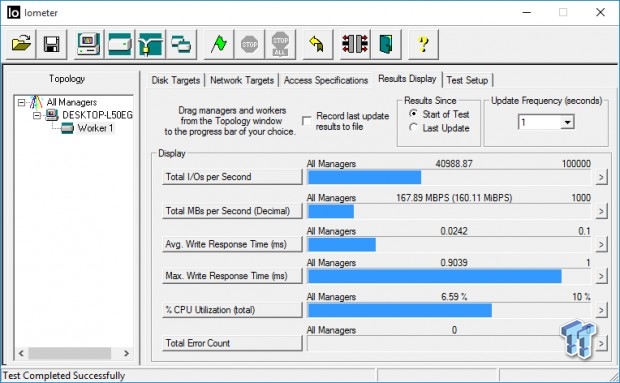
Avg. Read Response
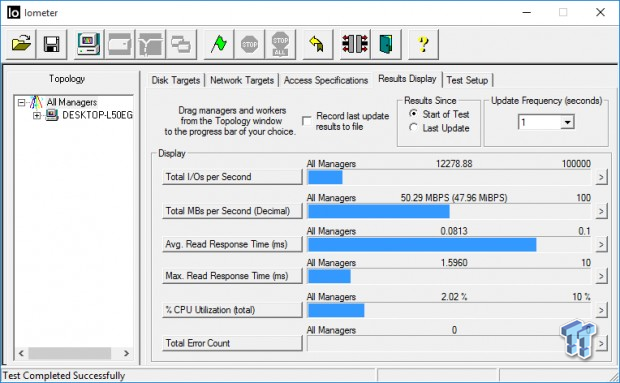
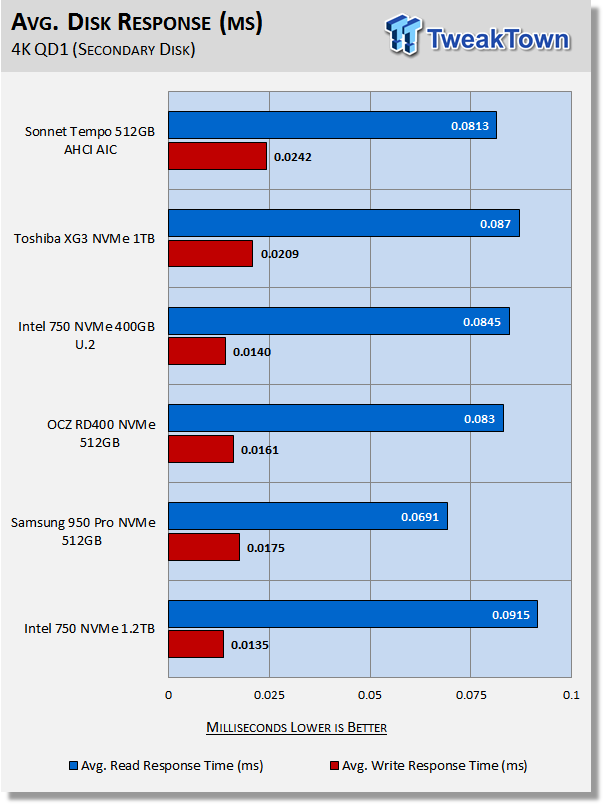
Due to Samsung's superior architecture, the Tempo delivers excellent read response, second only to the 950 Pro. However, the limitations of AHCI show up when measuring write response. All of the NVMe powered drives in our test pool deliver better (lower) write response in comparison to the AHCI-powered Tempo.
DiskBench - Transfer Rate
Version and / or Patch Used: 2.6.2.0
We use DiskBench to time a 28.6GB block (9,882 files in 1,247 folders) composed primarily of incompressible sequential and random data as it's transferred from our DC P3700 PCIe NVME SSD to our test drive. We then read from a 6GB zip file that's part of our 28.6GB data block to determine the test drive's read transfer rate. Our system is restarted prior to the read test to clear any cached data, ensuring an accurate test result.
Write Transfer Rate
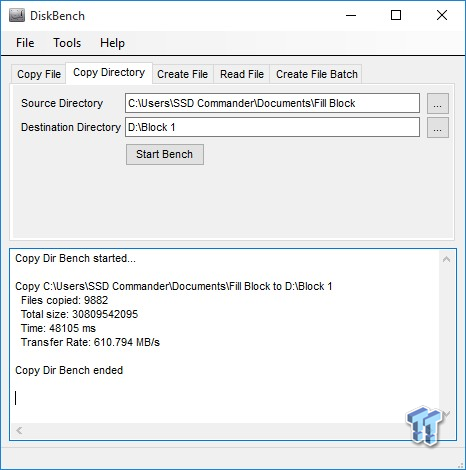
Read Transfer Rate
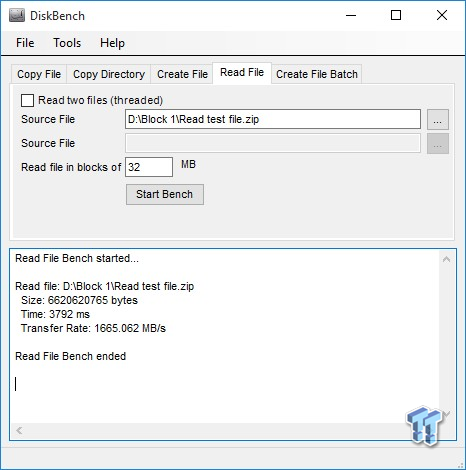
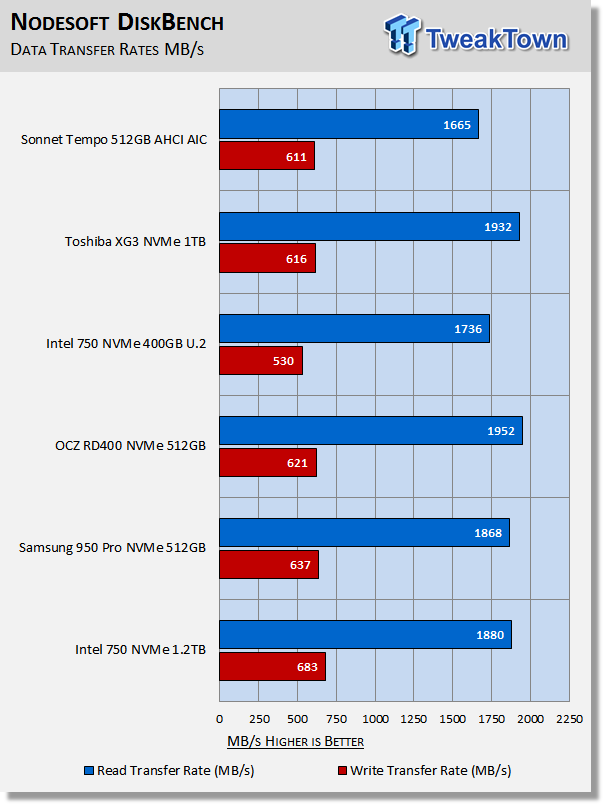
The Tempo delivers good transfer rates, even managing to outperform the 400GB Intel 750 NVMe drive with write transfers. The seemingly low write transfer rates of all the SSDs on our chart, we have come to find, is due to Windows 10 aggressive power mode switching.
Note: We are starting to transition to Windows 10 Anniversary Edition and have noticed that write transfer rates have nearly doubled due to Anniversary Edition's new relaxed power mode switching scheme. This is not reflected in this review, but will be reflected in forthcoming reviews.
Benchmarks (Secondary Volume) – PCMark 8 Extended
Futuremark PCMark 8 Extended
Heavy Workload Model
PCMark 8's consistency test simulates an extended duration heavy workload environment. PCMark 8 has built-in, command line executed storage testing. The PCMark 8 Consistency test measures the performance consistency and the degradation tendency of a storage system.
The Storage test workloads are repeated. Between each repetition, the storage system is bombarded with a usage that causes degraded drive performance. In the first part of the test, the cycle continues until a steady degraded level of performance has been reached. (Steady State)
In the second part, the recovery of the system is tested by allowing the system to idle and measuring the performance after 5-minute long intervals. (Internal drive maintenance: Garbage Collection (GC)) The test reports the performance level at the start, the degraded steady-state, and the recovered state, as well as the number of iterations required to reach the degraded state and the recovered state.
We feel Futuremark's Consistency Test is the best test ever devised to show the true performance of solid state storage in an extended duration heavy workload environment. This test takes on average 13 to 17 hours to complete and writes somewhere between 450GB and 14,000GB of test data depending on the drive. If you want to know what an SSDs steady state performance is going to look like during a heavy workload, this test will show you.
Here's a breakdown of Futuremark's Consistency Test:
Precondition phase:
1. Write to the drive sequentially through up to the reported capacity with random data.
2. Write the drive through a second time (to take care of overprovisioning).
Degradation phase:
1. Run writes of random size between 8*512 and 2048*512 bytes on random offsets for 10 minutes.
2. Run performance test (one pass only).
3. Repeat 1 and 2 for 8 times, and on each pass increase the duration of random writes by 5 minutes.
Steady state phase:
1. Run writes of random size between 8*512 and 2048*512 bytes on random offsets for 50 minutes.
2. Run performance test (one pass only).
3. Repeat 1 and 2 for 5 times.
Recovery phase:
1. Idle for 5 minutes.
2. Run performance test (one pass only).
3. Repeat 1 and 2 for 5 times.
Storage Bandwidth
PCMark 8's Consistency test provides a ton of data output that we use to judge a drive's performance.
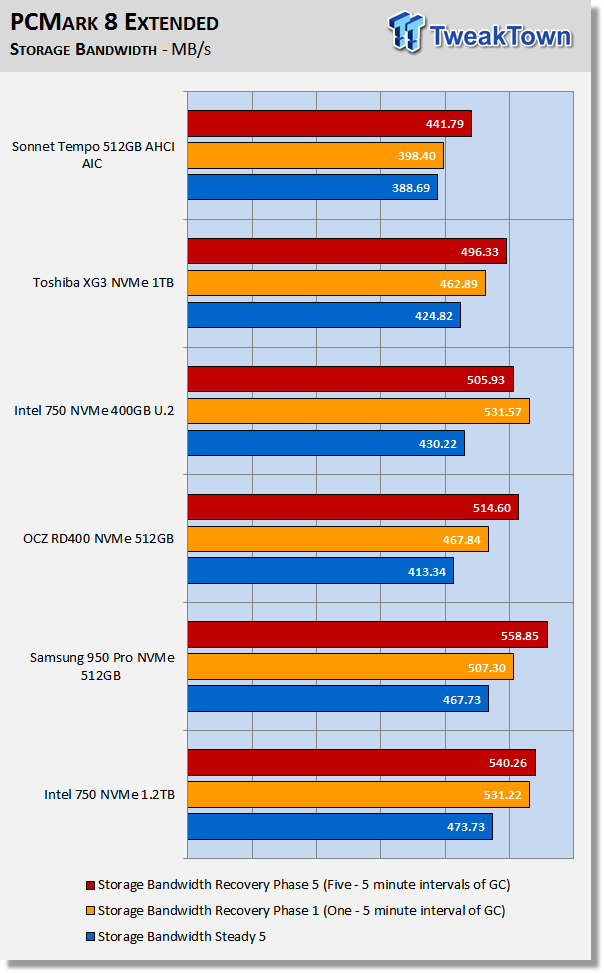
We consider steady state bandwidth (the blue bar) our test that carries the most weight in ranking a drive/arrays heavy workload performance. Performance after Garbage Collection (GC) (the orange and red bars) is what we consider the second most important consideration when ranking a drive's performance. Trace-based steady state testing is where true high performing SSDs are separated from the rest of the pack.
When it comes to extended heavy workloads, NVMe really shows its superiority. The Tempo chewed through moderate workloads with ease, but heavy workloads of this nature are another matter. The Tempo with its aging AHCI protocol is no match for the NVMe SSDs that comprise the remainder of our test pool.
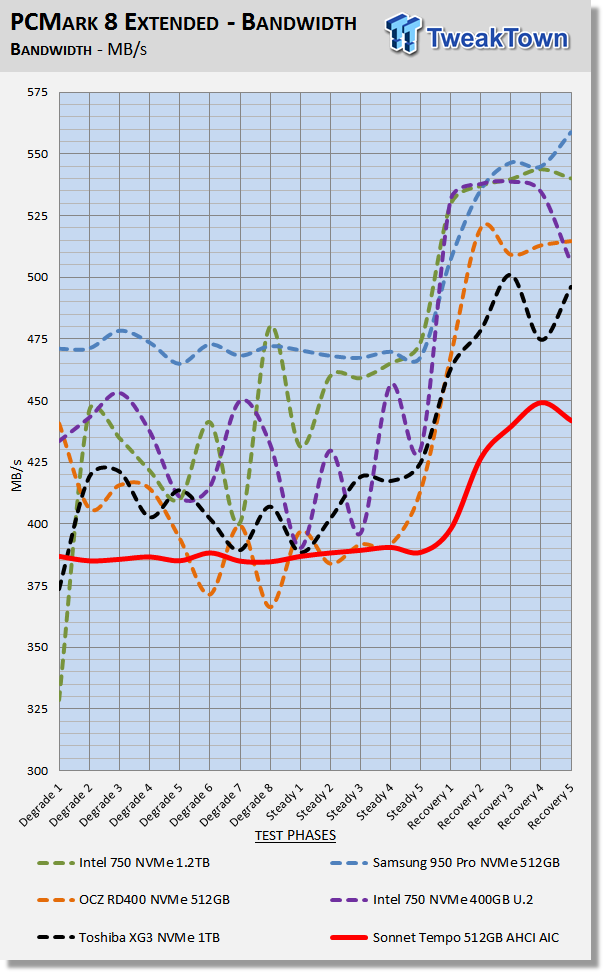
We chart our test subject's storage bandwidth as reported at each of the test's 18 trace iterations. This gives us a good visual perspective of how our test subjects perform as testing progresses. This chart sheds more light on how the drives perform as they progress through the testing phases.
Total Access Time (Latency)
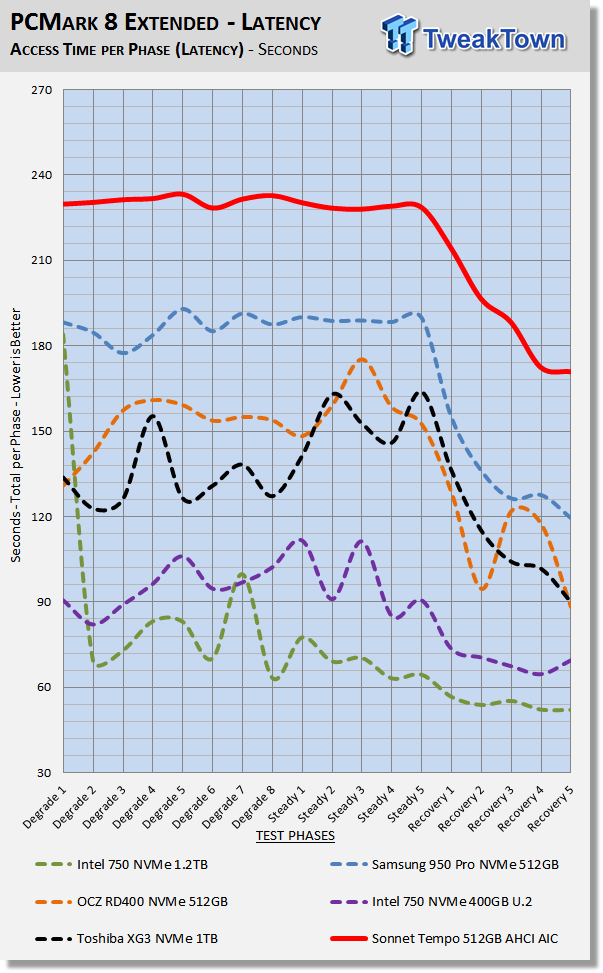
The advantages of the NVMe protocol over AHCI is clearly displayed on this chart.
Disk Busy Time
Disk Busy Time is how long the disk is busy working. We chart the total time the disk is working as reported at each of the tests 18 trace iterations.
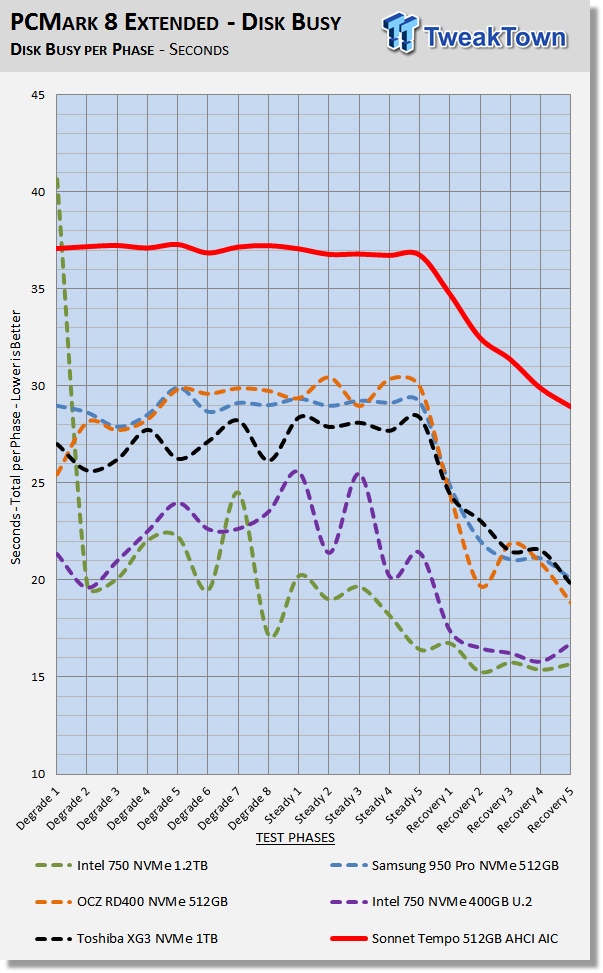
When latency is low, disk busy time is low as well.
Data Written
We measure the total amount of random data that our test drive/array is capable of writing during the degradation phases of the consistency test. Pre-conditioning data is not included in the total. The total combined time that degradation data is written to the drive/array is 470 minutes. This can be very telling. The better a drive/array can process a continuous stream of random data; the more data will be written.
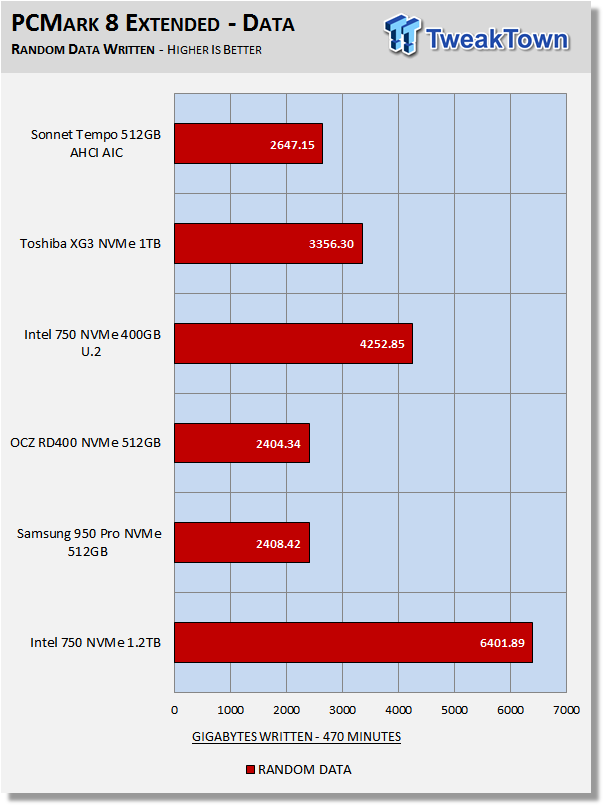
Surprisingly, the Tempo manages to write more data than the 950 Pro and RD400. We attribute this to the Tempo's heat sink keeping thermal throttling at a minimum. The Intel SSD's win this test easily due to a healthy dose of overprovisioning.
Benchmarks (Secondary Volume) – 70/30 Mixed Workload
70/30 Mixed Workload Test (Sledgehammer)
Version and / or Patch Used: Iometer 2014
Heavy Workload Model
This test hammers a drive so hard we've dubbed it "Sledgehammer". Our 70/30 Mixed Workload test is designed to simulate a heavy-duty enthusiast/workstation steady-state environment. We feel that a mix of 70% read/30% write, full random 4K transfers best represents this type of user environment. Our test allows us to see the drive enter into and reach a steady state as the test progresses.
Phase one of the test preconditions the drive for 1 hour with 128K sequential writes. Phase two of the test runs a 70% read/30% write, full random 4K transfer workload on the drive for 1 hour. We log and chart (phase two) IOPS data at 5-second intervals for 1 hour (720 data points). 60 data points = 5 minutes.
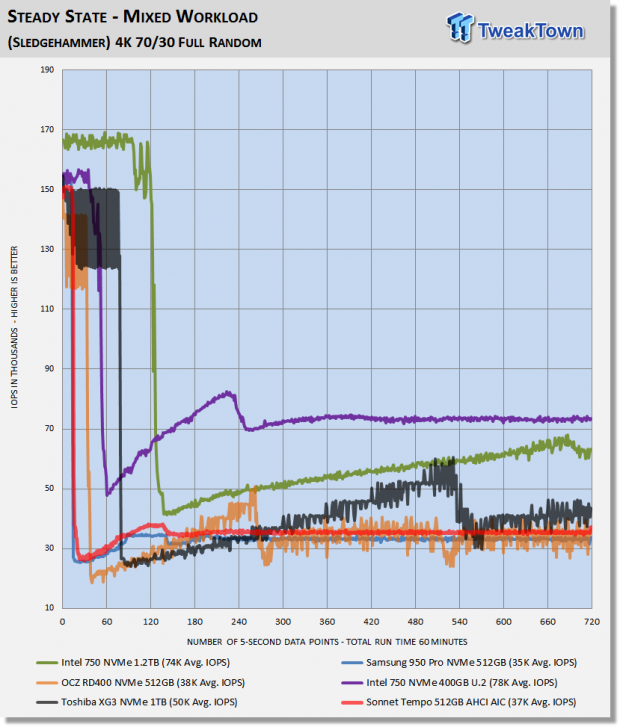
What we like about this test is that it reflects reality. Everything lines up, as it should. Consumer drives don't outperform Enterprise-Class SSDs that were designed for enterprise workloads. Consumer drives based on old technology are not outperforming modern Performance-Class SSDs, etc.
The Tempo manages to defeat the 950 Pro outright. The RD400 delivers a 1K better average. However, we will still give the nod to the Tempo because of its tight, consistent performance. Overall the Intel 750 400GB wins this test with a massive 78K IOPS average.
Maxed-Out Performance (MOP)
This testing is just to see what the drive is capable of in an FOB (Fresh Out of Box) state under optimal conditions. We are utilizing Windows Server 2012 R2 64-bit OS for this testing. Same Hardware, just an OS change.
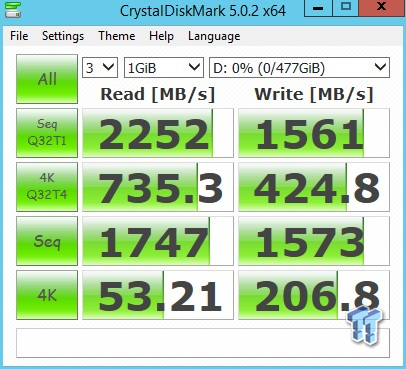
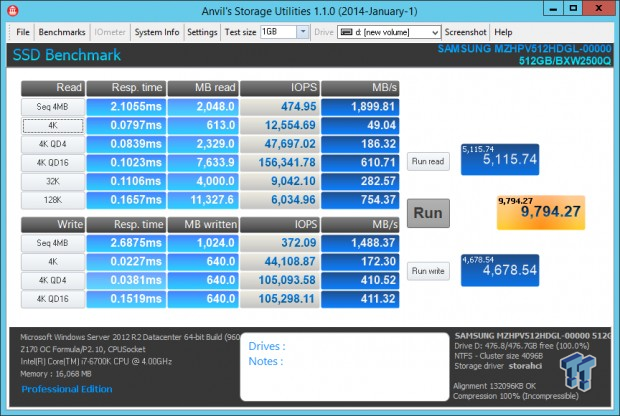
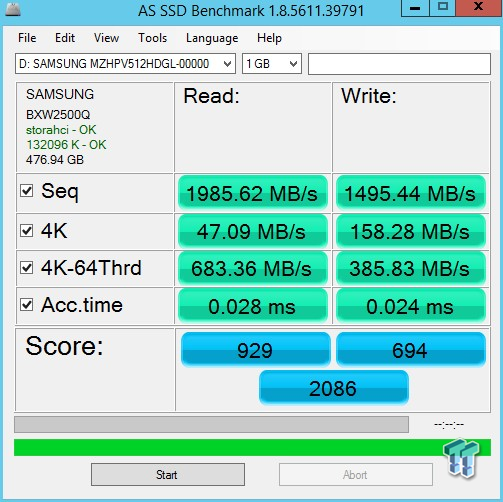
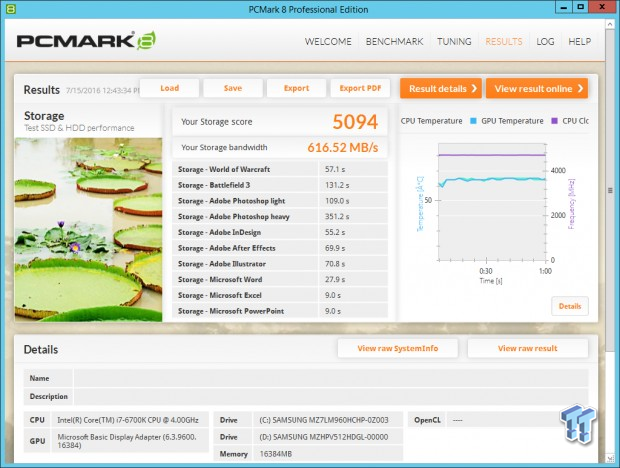
Normally we like to use Server 2008 R2 for this testing whenever possible because if there is a dedicated driver, 2008 R2 delivers the best performance bar none. But the Tempo is AHCI, so it performs best with Server 2012 R2 because it has a superior AHCI driver built-in.
Final Thoughts
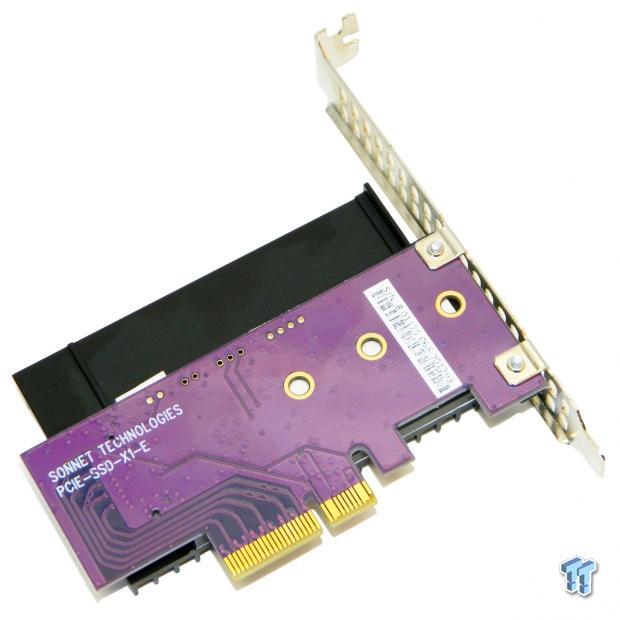
Before we even began testing, we knew the Tempo would deliver excellent performance simply because it is a Samsung Gen 3 x4 PCIe SSD. The Tempo did not disappoint, proving that it can still hang with its NVMe counterparts. We love the heat sink on the Sonnet design. It does virtually eliminate any thermal throttling issues that we previously experienced with the Samsung SM951 AHCI SSD.
Sonnet's Tempo really shines with arguably the most important category of our testing - moderate workloads. Looking at back at our moderate workload testing, the Tempo was able to handily outperform all but the 950 Pro with ease; even defeating the 950 Pro once with slightly better Vantage steady-state performance. Samsung's superior architecture was on full display considering the Tempo is an almost two-year-old AHCI based SSD and yet it is still able to outperform most modern NVMe based SSDs with moderate workloads.
Our user experience while running the Sonnet Tempo SSD as our OS disk is outstanding. Every task we threw at the drive was handled almost instantaneously. Our system booted as fast or faster than any SSD we've ever used. These are the hallmarks of a superior SSD. After all, it all comes down to the user experience.
Sonnet's Tempo presents us with a conundrum of sorts. Based on the performance it delivers, it is easy to recommend the Tempo to our readers. But, we do feel that the Tempo is an overpriced piece of hardware, especially for the typical Windows enthusiast. Sonnet's primary focus is Mac first. Mac users typically don't mind spending more for less, or they would not be using a Mac in the first place. With this in mind, the Tempo may be appropriately priced for Mac users.
Additionally, we are a bit skeptical of Sonnet's one-year warranty, but it's still not a deal breaker because the Samsung SM951 at the heart of the Tempo is a known entity. Sonnet's Tempo is a custom design with a much-needed heat sink, which will improve the SM951 AHCI's overall longevity as well as performance consistency.
Sonnet's Tempo PCIe SSD is TweakTown recommended for Mac users who don't mind paying a premium.
Pros:
- Performance
- Heatsink
- Compatibility
Cons:
- Price Point
- One-Year Warranty

